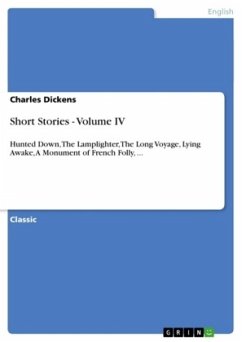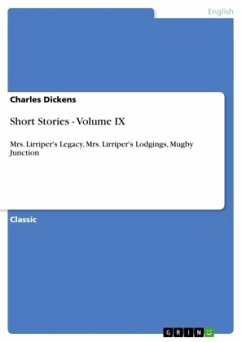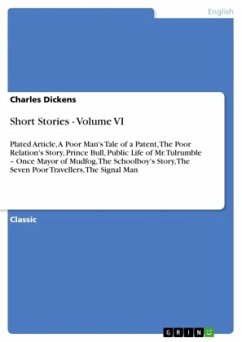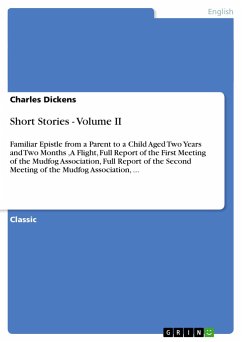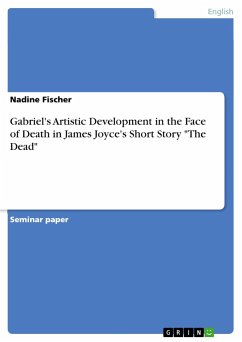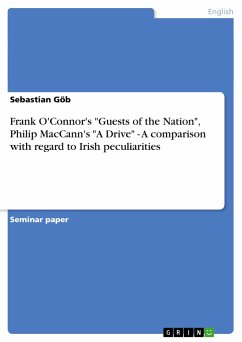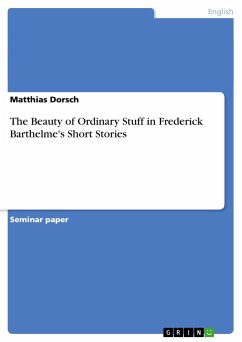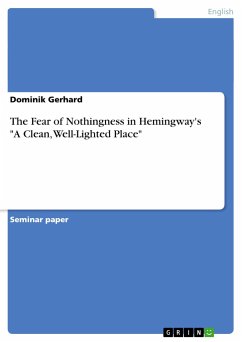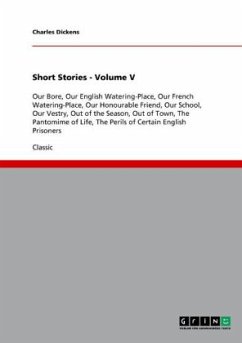
Short Stories - Volume V
Our Bore, Our English Watering-Place, Our French Watering-Place, Our Honourable Friend, Our School, Our Vestry, Out of the Season, Out of Town, The Pantomime of Life, The Perils of Certain English Prisoners
Versandkostenfrei!
Versandfertig in 1-2 Wochen
15,99 €
inkl. MwSt.

PAYBACK Punkte
0 °P sammeln!
Classic from the year 2009 in the subject English Language and Literature Studies - Literature, , language: English, abstract: Our Bore IT is unnecessary to say that we keep a bore. Everybody does. But, the bore whom we have the pleasure and honour of enumerating among our particular friends, is such a generic bore, and has so many traits (as it appears to us) in common with the great bore family, that we are tempted to make him the subject of the present notes. May he be generally accepted![...] *** Our English Watering-Place In the Autumn-time of the year, when the great metropolis is so muc...
Classic from the year 2009 in the subject English Language and Literature Studies - Literature, , language: English, abstract: Our Bore IT is unnecessary to say that we keep a bore. Everybody does. But, the bore whom we have the pleasure and honour of enumerating among our particular friends, is such a generic bore, and has so many traits (as it appears to us) in common with the great bore family, that we are tempted to make him the subject of the present notes. May he be generally accepted![...] *** Our English Watering-Place In the Autumn-time of the year, when the great metropolis is so much hotter, so much noisier, so much more dusty or so much more water-carted, so much more crowded, so much more disturbing and distracting in all respects, than it usually is, a quiet sea-beach becomes indeed a blessed spot.[...] *** Our French Watering-Place Having earned, by many years of fidelity, the right to be sometimes inconstant to our English watering-place, we have dallied for two or three seasons with a French watering-place: once solely known to us as a town with a very long street, beginning with an abattoir and ending with a steam-boat, which it seemed our fate to behold only at daybreak on winter mornings, when (in the days before continental railroads), just sufficiently awake to know that we were most uncomfortably asleep, it was our destiny always to clatter through it, in the coupe of the diligence from Paris, with a sea of mud behind us, and a sea of tumbling waves before.[...] *** Our Honourable Friend We are delighted to find that he has got in! Our honourable friend is triumphantly returned to serve in the next Parliament. He is the honourable member for Verbosity - the best represented place in England.[...] *** Our School We went to look at it, only this last Midsummer, and found that the Railway had cut it up root and branch. A great trunk-line had swallowed the playground, sliced away the schoolroom, and pared off the corner of the house: which, thus curtailed of its proportions, presented itself, in a green stage of stucco, profilewise towards the road, like a forlorn flat-iron without a handle, standing on end.[...] *** Our Vestry We have the glorious privilege of being always in hot water if we like. We are a shareholder in a Great Parochial British Joint Stock Bank of Balderdash. [...] *** Out of the Season It fell to my lot, this last bleak Spring, to find myself in a watering-place out of the Season. A vicious north-east squall blew me into it from foreign parts, and I tarried in it alone for three days, resolved to be exceedingly busy.[...] *** [...]




